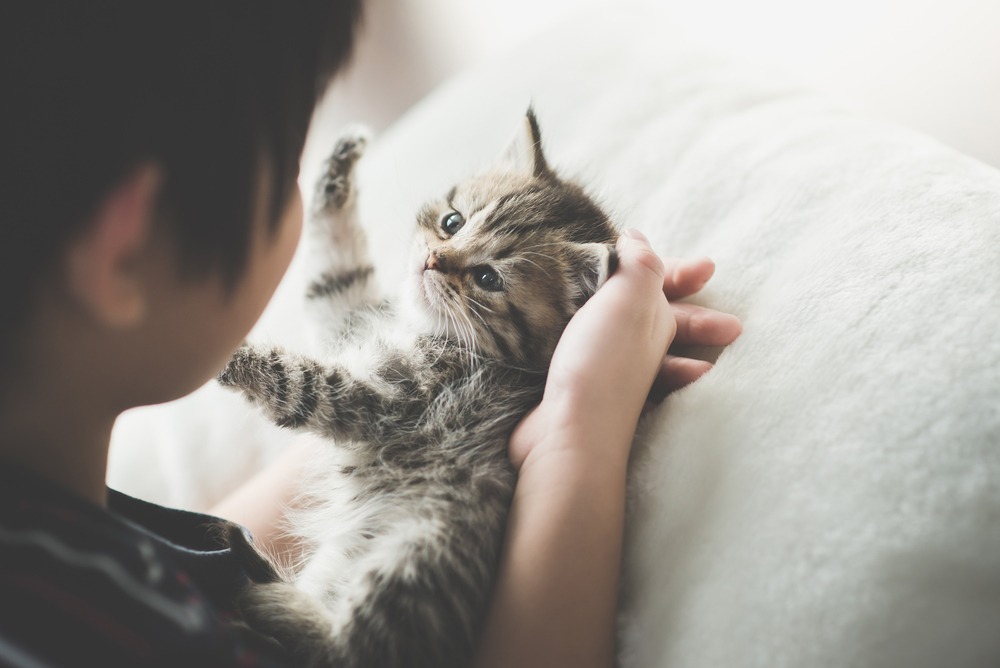
There’s nothing quite as exciting as bringing a new kitten into your home. They’re arguably the cutest animals in the world and need lots of love and attention to live happy lives. Whether you’ve had a kitten before or if you’re a first time pet parent, there are several ways you can prepare yourself- and your home- for the new arrival.
Create a shopping checklist
Once you’ve found your fur baby and decided they’re going to be the perfect addition to your family, it’s time to get shopping and get everything you need for when you bring them home. We’ve put together the complete list of things you’ll need to buy:
-
A cosy bed
-
A selection of toys
-
A good quality scratching post or tree
-
High quality kitten food
-
A litter tray and scoop
-
Anti-bacterial cat litter
-
Food & water bowls
-
A kitten carrier
-
A grooming kit
Register your kitten at the local vet
In life, you never know what’s just around the corner so it’s definitely worth registering your kitten at the local vet from the outset. Like all animals, cats occasionally get sick or injure themselves so it’s important to have a vet on hand if your kitten needs medical attention. It’s also worth taking out pet insurance to help deal with the costs associated with unforeseen medical attention.
Make sure your kitten is ready to come home
Kittens shouldn’t be separated from their mother before eight weeks old. They should also have had their first round of vaccinations and started toilet training before descending on their forever home. Speak to the person you’re getting your kitten from and figure out whether they’ve taken all the necessary steps to prepare your bundle of joy.
Kitten-proof, kitten-proof, kitten-proof
Much like babies, kittens have a way of getting up to no good. Cats are naturally curious and have little regard for items in your house that may be precious to you. Do the rounds in your home before your kitten makes an appearance and remove anything that you wouldn’t want your kitten getting their paws on. Organise your wires and keep them tucked away where your kitty can’t get at them; the last thing you want is for them to chew through your cables! Anything that dangles or is string-like in appearance will be irresistible to your cat, so be sure to remove any elastic bands, ribbons or hair ties. Kittens also like to sample items that may not be food, so if there’s anything small lying around, like erasers or mables, be sure to put them somewhere safe.
Kittens like to scratch, it’s just a fact of life. If you have furniture that you’d rather your kitten not use as a scratching post, be sure to cover it with a blanket or kitten cover. If you have plants in your home, double check they’re aren’t toxic before letting your fur baby loose in his/her new digs. It’s also worth doing the rounds in your house and closing all the windows. Make sure you keep an eye on this going forward too; cats may have nine lives, but you wouldn’t really want to put it to the test.
The first few weeks
When the big day finally arrives, have a plan of action in place to ensure you’re starting off on the right foot. Begin to socialise your cat early on, introducing them to other cats, dogs and humans. Take the time each day to show your cat affection; pick them up and pet them, but try not to overwhelm them with the feeling love you will no doubt have for them (we know it’s hard, but cats can find too many cuddles quite irritating). If your cat shows signs of negative behaviour, try to ignore them as much as possible and combat this by rewarding positive behaviour. Your fur baby will soon get the message of what’s allowed and what’s not. You’re the boss after all! (Kind of).
Round two vaccinations
At around twelve weeks old, your kitten will need their second round of vaccinations. This will protect your pride and joy from many infections and diseases so try to get your kitty’s appointment pencilled in well in advance. Most pet owners also get their cats neutered or spayed once they’ve had their vaccinations. Obviously if you’re planning on breeding then you can skip this step but if you want to keep your family small, it’s just something that has to be done. Your kitten will forgive you, we promise.
Consider switching up their food brand
By the time they’re four months old, your kitten is no longer a baby (sob) and you may want to consider upgrading their kitten food to cat food. You can also start introducing them to cat treats, but make sure you give them these in moderation. Webbox caters to both kittens and cats so you’ll be sure to find the perfect food for your cat here on our website. Shop online today or visit one of our stockists while stocks last.

Shop for Dogs
Personalise your search:
Shop for Cats
Personalise your search:
Our Most Popular Products

Webbox Dog Treasure Hunt Eggs

Webbox Lick-e-Lix with Beef Cat Treats

Webbox Lick-e-Lix Liver Sausage & Cat Grass Cat Treats

Webbox Lick-e-Lix Cheese & Taurine Cat Treats

Webbox Lick-e-Lix Chicken Cat Treats

Squeaky Ball

Webbox Naturals Fish & Meat in Jelly Wet Cat Food

Webbox Naturals Tuna Mousse Wet Cat Food

Webbox Naturals Dry Adult Cat with Chicken and Duck Dry Food

Webbox Cat Easter Egg
Get the latest tips ‘n’ advice
Want to find out interesting facts and get helpful tips?
Need help choosing the right food?
Try our Pet Food Finder.

 FREE delivery on orders over £40!
FREE delivery on orders over £40!







